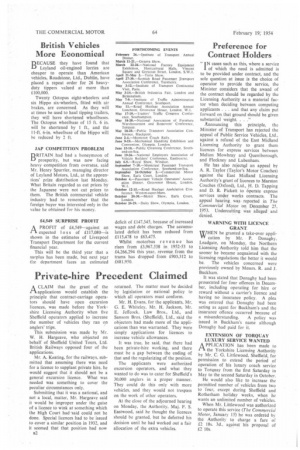British Vehicles More Economical
Page 36

If you've noticed an error in this article please click here to report it so we can fix it.
BECAT-JSE they have found that Leyland oil-engined lorries are cheaper to operate than American vehicles, Roadstone, Ltd., Dublin, have placed a repeat order for 26 heavyduty tippers valued at more than £100,000
Twenty Octopus eight-wheelers and six Hippo six-wheelers, fitted with air brakes, are concerned. As they will at times be used to haul tipping trailers, they will have shortened wheelbases. The Octopus wheelbase of 15 ft. 6 in. will be shortened by 1 ft., and the 11-ft. 6-in, wheelbase of the Hippo will be reduced by 2 ft.
IA? COMPETITION PROBLEM BMT/UN had had a honeymoon of prosperity, but was now facing heavy competition from overseas, said Mr. Henry Spurrier, managing director of Leyland Motors, Ltd., at the apprentices' prize distribution last Monday. What Britain regarded as cut prices by the Japanese were not cut prices to them. The British commercial vehicle industry had to remember that the foreign buyer was interested only in the value he obtained for his money.
£4,549 SURPRISE PROFIT APROFIT of £4,549—against an expected loss of £117,080—is shown in the estimates of Liverpool Transport Department for the current financial year.
This will be the third year that a surplus has been made, but next year the department faces an estimated deficit of £147,345, because of increased wages and debt charges. The accumulated deficit has been reduced from £115,478 to £63,475.
Whilst motorbus revenue has risen from £3,967,538 in 1952-53 to 14,266,294 this year, revenue from the trams has dropped from £903,312 to £681.950.




























































































